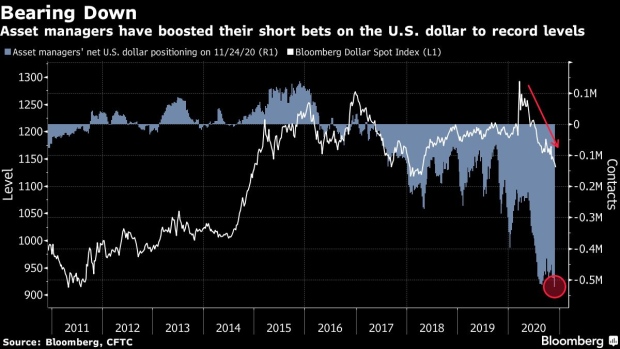Dec 3, 2020
One by One, Dollar Is Dropping to Multi-Year Lows Against Peers
, Bloomberg News

(Bloomberg) -- One by one, the dollar is dropping to multi-year lows against its peers in December.
The euro, the Australian and Canadian dollars, and the Korean won have all touched their highest levels in more than two years this week, while the Swiss franc is at its strongest since 2015. More weakness in the greenback may come as asset managers build record short bets.
Optimism over U.S. stimulus talks, bets on a successful roll-out of vaccines and China’s economic rebound are driving bets for global growth and against the world’s reserve currency. Some on Wall Street are warning that the greenback will undergo a bearish cycle with the Federal Reserve keeping rates low for years.
“A smooth vaccine roll-out soon can potentially be a game changer” as it may accelerate growth recovery and entrench dollar weakness, said Christopher Wong, senior foreign-exchange strategist at Malayan Banking Bhd. in Singapore. “Procyclical-proxy currencies including the Aussie, kiwi in developed market space and won in Asia excluding Japan can benefit while the dollar remains on the backfoot.”
The dollar has declined against major peers in seven of the first 11 months of the year, according to the Bloomberg Dollar Spot Index. It has also dropped more than 8% against the Swiss franc and 4% versus the yen in 2020, two other traditional haven currencies, underlining the impact of the Fed’s unprecedented stimulus.
Fed Chair Jerome Powell said Wednesday that the central bank will keep rates low until the economy is “very clearly past the danger” from the pandemic. During the global financial crisis, when the U.S. central bank employed quantitative easing, the dollar had gone through a similar decline.
Here are key levels that were breached this week:
- The euro has broken through the psychological level of 1.20 against the dollar. It touched 1.2125 on Thursday, strongest since April 2018
- The Canadian dollar strengthened to C$1.2910 on Wednesday, highest since October 2018
- The Australian dollar rose to 74.20 U.S. cents, its highest level in more than two years on Wednesday
- The Swiss franc soared to its highest since January 2015
- The risk-sensitive Korean won rose to 1096.85 against the dollar, its strongest since June 2018, after breaking the key 1,100 level
Credit Suisse Group AG is forecasting that the euro may rise to 1.25 by the end of 2021, while Goldman Sachs Asset Management favors shorting the dollar against the yuan, and sees further gains in the euro and yen. Morgan Stanley and Citigroup Inc. have also forecast a weaker greenback.
“Risk-on sentiment seemed to catch another leg higher this week -- we think this should accelerate the USD’s tilt lower in the near term,” said Terence Wu, FX strategist at Oversea-Chinese Banking Corp. in Singapore. “This round of USD weakness is still more focused in the G-10 space” although “we expect USD-Asia downside to open up in time.”
©2020 Bloomberg L.P.